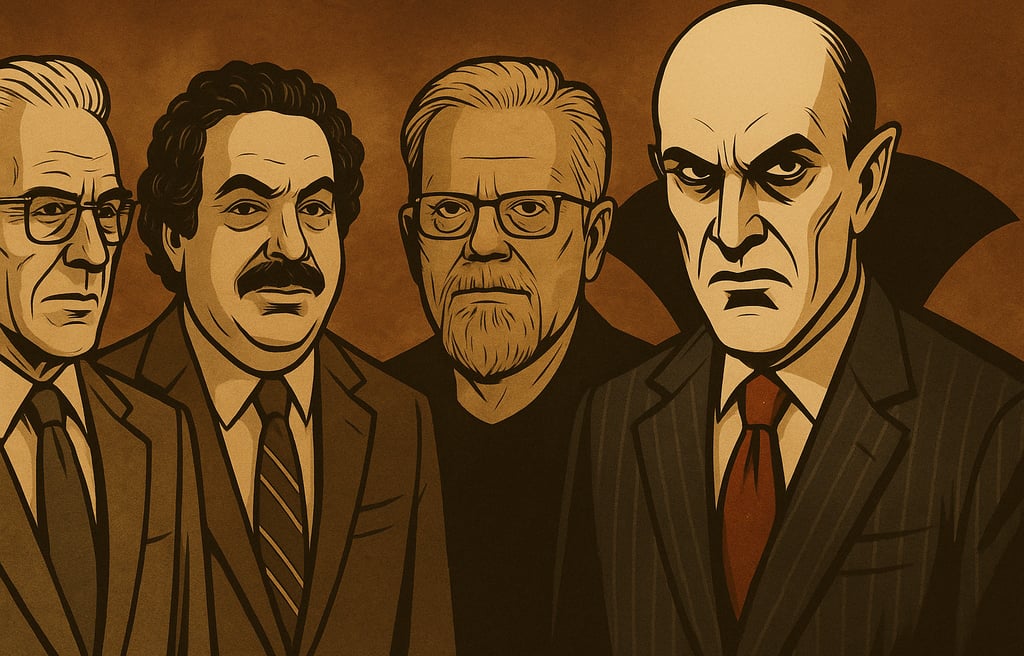Legal Shields, Vampire Scholars, and the Cult of Religious Liberty: How Jehovah’s Witnesses Outsource Their Defense
When lawsuits and scrutiny pile up, Watchtower doesn’t just turn to Scripture — it calls in lawyers, lobbyists, and a vampire expert. What sounds like satire is part of a serious pattern: religious freedom is being weaponized to shield high-control groups from accountability.
X-PANDED
Oliver
4/19/20254 min read


X-panded from: https://x.com/pimitopomo/status/1734270561650368739?s=61 & https://x.com/pimitopomo/status/1746647598990074011?s=46
When most people think of Jehovah’s Witnesses in court, they picture landmark Supreme Court victories for free speech and religious liberty—cases about flag salutes, door-to-door preaching, and medical conscience. But what most people don’t realize is that behind those headlines is a highly coordinated defense strategy, one that includes not only in-house legal teams, but a roster of external lawyers and scholars trained to reframe criticism as persecution.
And if you follow the paper trail, you start to notice how deep the rabbit hole goes—and who’s helping dig it.
The Legal Veteran: Barry A. Fisher
In a 1995 statement to a U.S. congressional subcommittee, constitutional lawyer Barry A. Fisher introduced himself as a longtime defender of religious minorities. He got his start working alongside Hayden C. Covington, the famed Jehovah’s Witness lawyer whose courtroom wins defined mid-20th century U.S. First Amendment law.
“I'm Barry Fisher of the Los Angeles firm Fleishman, Fisher & Moest, and for nearly 30 years, my practice has focused on constitutional law with a particular emphasis on freedom of reli gion. I began practicing law with Hayden Covington, the Jehovah's Witnesses lawyer their remarkable string of landmark first amend ment cases in the 1940's and 1950's, and since then, I've worked with a rich diversity of America's minority religious groups, often where religion is mixed is ethnicity, culture, language and nationality, including Black and Arab Muslims, Hispanic Pentecostalists, Korean Presbyterians, Cuban Santeros, Serbian Orthodox, Hare Krishnas, Orthodox Jewish groups, Rom — the correct name for what’s commonly called Gypsies — Native American religionists, and many others.”
— Barry A. Fisher, U.S. Congressional Statement, 1995
Source: justice.gov (PDF)
Fisher has also been profiled in Freedom Magazine, the publication of the Church of Scientology, praised for defending religious groups from state scrutiny (Vol. 29, Issue 1). But there’s a pattern here: Fisher doesn’t just defend freedom of belief — he defends institutions accused of authoritarian control and systemic harm.
The Scholars: Melton, Introvigne & the Cult of Cult Apologetics
When Watchtower needs backup beyond the courtroom, it taps into a different—but no less reliable—ecosystem: academic allies who specialize in defending “new religious movements.”
One of the most visible is J. Gordon Melton, a religious studies scholar known for cataloguing American religions. In 1992, Melton included Jehovah’s Witnesses in a list of “established cults.”
“In 1992, American religious scholar J. Gordon Melton placed the Jehovah's Witnesses denomination in a list of ‘established cults’…”
— Wikipedia: Criticism of Jehovah’s Witnesses
Since then, he and others in his circle have walked back the use of the term “cult,” claiming it’s too controversial. That shift happens to coincide with his deepening ties to CESNUR (Center for Studies on New Religions), an Italian-based organization that routinely defends groups like Scientology, the Unification Church, and Jehovah’s Witnesses.
CESNUR’s media outlet, Bitter Winter, is edited by Massimo Introvigne, a prolific contributor of articles portraying Jehovah’s Witnesses as religious martyrs under siege by hostile governments.
And here’s where the irony reaches full Watchtower-grade absurdity.
Massimo Introvigne — the same man featured in JW.org videos as a supposedly neutral expert on religious liberty — also happens to be a self-described scholar of Satanism, vampires, and occult subcultures. He’s authored Satanism: A Social History (Brill, 2016), and co-founded the Transylvanian Society of Dracula. He’s delivered public lectures and academic work on the sociology of vampire myths and magical rituals (Google Scholar profile).
For a religion that once instructed members to destroy “demonic” books and steer clear of Smurfs, horoscopes, and Harry Potter, this partnership is laughable — until you realize it’s not a joke. It’s strategic. Watchtower will work with anyone, as long as they protect the organization’s image.
Follow the Money: A Quiet Acknowledgment
The first page of the expert opinion submitted to the Dutch Ministry of Justice (archived PDF) states that the report was commissioned by the law firm of Shane Brady, who represents the Christian Congregation of Jehovah’s Witnesses in the Netherlands. The authors, among them Massimo Introvigne and Holly Folk, were tasked with reviewing a critical study on abuse and reporting culture within the Jehovah’s Witnesses and producing a response based on their academic backgrounds.
In professional contexts, such commissioned reports are rarely pro bono. The wording — "we have been requested by the law firm... to examine the report" — suggests that this was a formal, compensated engagement. While the document does not explicitly confirm payment, it strongly implies it, and considering the academic reputations and institutional affiliations of the authors, it’s more than fair to infer financial motivation.
This is supported further by sociologist Steven A. Kent, who has written critically about Massimo Introvigne’s role as a frequent expert witness in court cases involving controversial religious groups. Kent notes that Introvigne has been relied upon in legal defenses and public relations efforts by groups like the Jehovah’s Witnesses, the Church of Scientology, and the Unification Church — often in ways that blur the line between scholarship and advocacy. (source)
So while we may not have a receipt, we do have a pattern. And in that pattern, Watchtower doesn’t just rely on in-house defense. It strategically recruits and compensates external voices who present themselves as neutral experts while operating in its interest.
At that point, it’s not religious studies — it’s paid influence.
This is not speculation. It’s an admission. Watchtower’s lawyers are funding the same academics being platformed as neutral experts in courtrooms and official publications.
At that point, it’s not religious studies — it’s paid influence.
In a Nutshell
This isn’t about denying religious freedom. It’s about demanding transparency.
Why does a religious organization that claims to “let the truth speak for itself” need this kind of backup?
Why are survivors’ voices drowned out by legal maneuvering and paid academic framing?
And why is a man who co-founded a Dracula society showing up on JW.org as an authority on religious liberty?
Freedom of religion is sacred. But when it becomes a smokescreen for coercion, abuse coverups, and reputation laundering, it’s time to call it what it is: a fortress, not a freedom.
And if your religious organization needs a constitutional lawyer, a team of cult apologists, and a vampire scholar to keep its image intact… maybe you’re not being persecuted.
Maybe you're just being found out.
